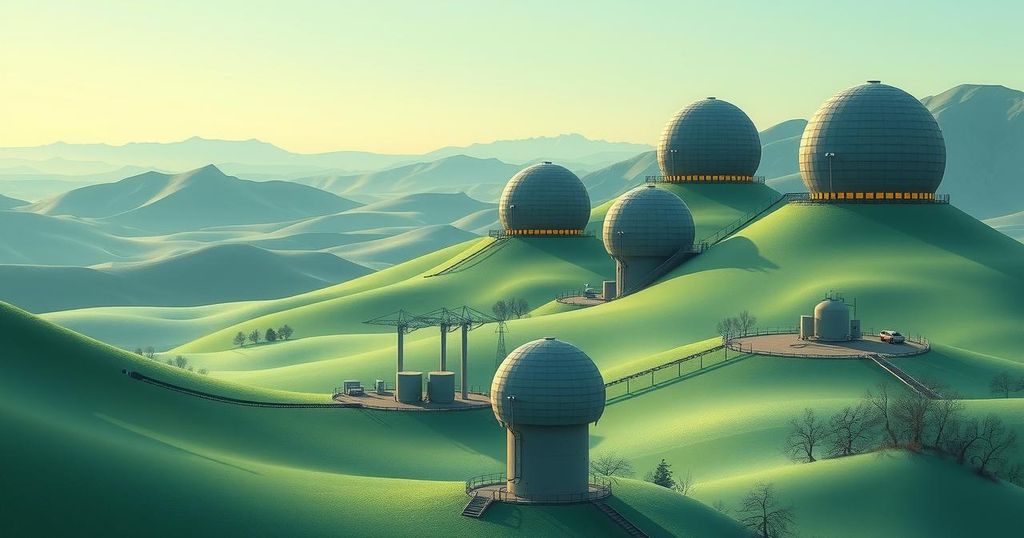Syria to Allow IAEA Immediate Access to Suspected Nuclear Sites

Syria’s government has granted immediate access to IAEA inspectors for suspected nuclear sites. Director-General Grossi confirmed this after a meeting with President al-Sharaa, who is also interested in future nuclear energy. The IAEA aims to clarify past nuclear activities while expressing concerns about potential risks of enriched uranium. Grossi also commented on U.S.-Iran nuclear negotiations, noting a hopeful outlook for agreements.
In a significant development, Syria has agreed to allow the United Nations’ atomic energy inspectors immediate access to sites suspected of past nuclear activities. This revelation comes from Rafael Mariano Grossi, the director-general of the International Atomic Energy Agency (IAEA), during an exclusive interview in Damascus with President Ahmad al-Sharaa and other Syrian officials.
Grossi noted that President al-Sharaa showed interest in future nuclear energy exploration for Syria, saying, “Why not?” This openness aligns with the IAEA’s goal to clarify various past activities, which they believe might be linked to nuclear weapons. Grossi expressed optimism about completing the inspection process in a matter of months, reflecting a commitment from the new Syrian government to engage in international cooperation amidst its transition.
Previously, an IAEA team conducted inspections in 2024 at certain sites while the former regime of Bashar Assad was still in power. Following Assad’s departure in December, the agency sought to regain access to sites connected to Syria’s nuclear undertakings. Historically, Syria, under Assad, reportedly ran a secretive nuclear program that included a reactor built clandestinely with North Korean aid in Deir el-Zour, aiming potentially to establish a weapons-grade plutonium production capability.
The reactor’s existence came to light only after Israeli airstrikes in 2007 destroyed the facility, and Syria has been less than forthcoming in addressing the IAEA’s inquiries since then. Grossi indicated that inspectors are set to revisit the Deir el-Zour reactor along with three other related sites, while also emphasizing the need to zero in on significant targets.
Although no evidence suggests releases of radiation from these locations, Grossi voiced concern about the potential presence of enriched uranium that could be at risk of misuse. Al-Sharaa’s government appears keen to engage with the IAEA, facilitating necessary inspections and even considering assistance for nuclear medicine, radiotherapy, and oncology infrastructure, which have been severely affected by over a decade of civil strife.
In addition to inspections, Grossi mentioned that Syria might explore options for small modular reactors, which are typically more cost-effective and simpler to deploy compared to traditional reactors. The interest in nuclear energy is parallel to moves initiated by neighboring countries such as Saudi Arabia and the United Arab Emirates.
On a broader scope, Grossi also touched upon ongoing negotiations between the U.S. and Iran concerning Tehran’s nuclear program. He highlighted his ongoing communications with involved parties, noting, “They are negotiating, it’s not us, but it is obvious that the IAEA will have to be the guarantor of whichever agreement they come to.” Despite existing tensions, both parties seem inclined toward reaching a deal, which Grossi sees as a positive sign.
He concluded by reflecting on the nature of diplomacy, remarking that genuine willingness for agreement is essential in negotiations—a sentiment he feels is present in the current U.S.-Iran discussions.
In summary, Syria’s new government is opening pathways for international nuclear inspections, marking a significant change in its diplomatic approach. The IAEA is poised to explore past nuclear activities and potential future nuclear energy developments. Furthermore, Grossi’s comments on U.S.-Iran negotiations indicate a cautious optimism in reaching agreements in a complex geopolitical landscape.
Original Source: www.ksat.com








